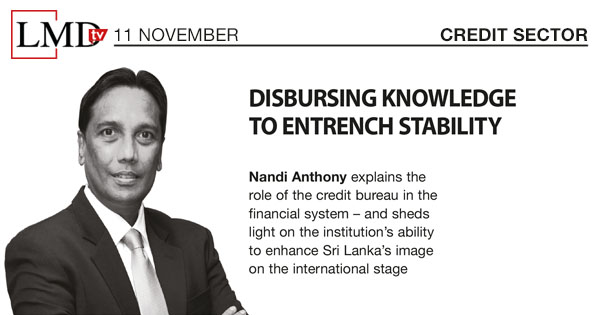“The main task of the Credit Information Bureau of Sri Lanka (CRIB) is ensuring that credit is propagated to all corners of society,” stated the bureau’s Director and General Manager Nandi Anthony as he described its role in the country’s financial system.
“A major aspect of CRIB’s role is making sure that the credit information provided helps maintain the health of lending institutions’ credit portfolios, which in turn ensures financial system stability,” he elaborated.
According to Anthony, CRIB’s main challenge in performing this task is balancing the competing requirements of various parties such as the needs of borrowers, lenders and the regulator.
As technology continues to be embraced across the world with demands for information to be distributed at an increasingly rapid pace, the credit bureau looks to deploy state-of-the-art products.
“We recently launched the credit score initiative, which will enable institutions to make credit decisions quickly,” he pointed out, explaining that the score – which ranges between 250 and 900 – serves as an indicator of the creditworthiness of and risk attached to borrowers.
According to Anthony, the credit score will enable borrowers to negotiate better terms with lenders and can be used as reputational collateral in the event that they do not possess traditional forms of collateral, such as land and houses.
Furthermore, the score may help Sri Lanka attract foreign investors. He noted that the initiative is set to improve the nation’s ease of doing business score based on feedback from a World Bank team. Along with the expected introduction of the new Secured Transactions Act, this could help Sri Lanka’s standing in the index.
In addition to this, CRIB is also looking to offer new digital products and services similar to credit bureaus in other markets.
To achieve this, a new credit bureau system is set to be launched next year, which will boast quicker processing speeds, larger data capacity, and features such as host to host connectivity with lenders’ core systems and analytics so that lending institutions can analyse their portfolios to identify underserved areas.
Summing up his views on the benefits of the system, Anthony stated: “With these new products, CRIB would be better positioned to serve borrowers, lenders and the regulator by providing information that enables them to do their job.”
Discussing CRIB’s role in the regulation of the financial services industry, he revealed that the credit bureau provides data to the macroprudential and research units of the Central Bank of Sri Lanka.
The credit score is expected to contribute to these efforts by serving as an early warning system, indicating whether lending institutions are facing difficulties so they can be nursed back to health.
Meanwhile, the bureau’s perception as a policing authority in the financial system is considered to be another critical challenge by Anthony: “This perception is incorrect because the reports provided to lending institutions do not include decisions or opinions – that responsibility lies solely with lenders.”
Expressing his views on the best practices of other countries that should be implemented in the local context, Anthony shed light on the importance of integrating the data of telcos and utility providers as “nontraditional data could be used as evidence of creditworthiness for those who have not obtained credit facilities previously.”
However, this raises questions about data security and the risk of individuals’ details being shared with third parties. In response, Anthony stressed that this is an aspect CRIB spends on while lending institutions are not able to access this data unless they intend to offer credit to a person.
“There are only six instances in which individuals’ data can be accessed by lending parties as stipulated in the CRIB Act and this will be strengthened by the implementation of data protection laws, which is anticipated,” he stated.




